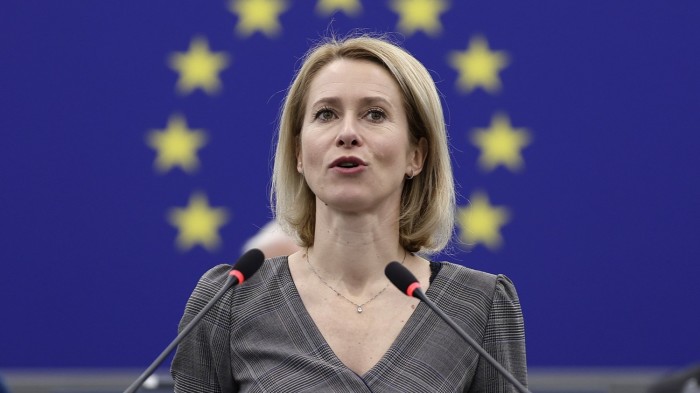Stay informed with free updates
Simply sign up to the War in Ukraine myFT Digest — delivered directly to your inbox.
Western capitals should stop suggesting peace talks to Ukrainian President Volodymyr Zelenskyy and instead ensure their promises of security guarantees to Kyiv are not “empty”, the EU’s chief diplomat has warned.
Kaja Kallas, the EU’s high representative on foreign affairs, said it was pointless pressuring Zelenskyy to consider peace talks when Russian President Vladimir Putin showed no desire to stop the war.
The former Estonian prime minister spoke to the Financial Times ahead of an EU leaders’ summit on Thursday set to discuss how Europe can adapt its support to Kyiv after Donald Trump returns to the White House.
“There’s no point pushing Zelenskyy to talk when Putin doesn’t want to talk,” Kallas told the FT. “We can’t talk about peacekeepers when there’s no peace. And why is there no peace? Because Russia does not want peace.”
Trump has vowed to suspend US military aid to Ukraine and push Kyiv into ceasefire negotiations, pledges that have forced EU capitals to reckon with how they could sustain support to the country, and assess whether it is even possible without Washington’s backing.
“Supporting Ukraine now is much cheaper than enduring the war later. Russia hasn’t changed their goals,” Kallas said. “I mean, we need to be very honest with ourselves in this regard. What are we really doing right now?”
On Wednesday evening Nato secretary-general Mark Rutte hosted talks with Zelenskyy and a small group of senior EU leaders including Italian Prime Minister Giorgia Meloni and German Chancellor Olaf Scholz to discuss potential options for the future of European support to Ukraine.
Speaking ahead of that meeting, Rutte said talk of a peace deal only helped Putin. “If we now start to discuss amongst ourselves what a peace deal could look like, we make it so easy for the Russians,” he said.
“I think we would be very wise to put some lid on this and focus on the business at hand . . . to make sure that Ukraine has what it needs to prevent Putin from winning.”
Zelenskyy will meet the EU’s 27 leaders on Thursday for more talks on the future of the war in light of Trump’s election and Europe’s struggles to maintain defence supplies to Ukraine amid production constraints and fiscal concerns across the bloc’s major economies.
EU leaders are set to agree a statement on Thursday vowing to support Ukraine “for as long as it takes and as intensely as needed. Russia must not prevail,” according to a draft agreed by their negotiators seen by the FT.
But EU leaders remain divided over what they can provide Kyiv and what long-term pledges of support they want to offer, including deploying troops, providing long-range weaponry or supporting the country’s Nato membership ambitions.
“The big question is, what is the security guarantee? . . . What actually is it, that is tangible?” Kallas said. “If it is not troops, if it is not long-range weapons, what is it actually that protects you and defends you when somebody is attacking you?”
“All the [EU] member states who have signed security guarantee agreements with Ukraine need to answer: what are they?” she added. “I mean, in reality, really what are they willing to put on the table that means these security guarantees would not be empty?”
French President Emmanuel Macron first floated the idea of deploying European troops to Ukraine in February. The concept has been discussed by some officials following Trump’s election in the context of a potential peacekeeping force to enforce a ceasefire agreement.
But Polish Prime Minister Donald Tusk flatly denied any “speculation” over European troops in Ukraine at a press conference with Macron last week. The idea is also strongly opposed by other key capitals such as Berlin.
“There are no preparations on [troops],” said one EU diplomat. “There is no structured discussion in the EU on this yet.”
“We shouldn’t underestimate our own power and overestimate Russia’s power,” said Kallas. “We have to do everything to strengthen Ukraine right now because the stronger they are on the battlefield, the stronger they are behind the negotiation table — if they come to that point.”
Additional reporting by Laura Dubois
Read the full article here




